File Info
| Exam | BTA Certified Blockchain Developer - Hyperledger |
| Number | CBDH |
| File Name | Blockchain.CBDH.PracticeTest.2019-04-12.55q.vcex |
| Size | 40 KB |
| Posted | Apr 12, 2019 |
| Download | Blockchain.CBDH.PracticeTest.2019-04-12.55q.vcex |
How to open VCEX & EXAM Files?
Files with VCEX & EXAM extensions can be opened by ProfExam Simulator.
Coupon: MASTEREXAM
With discount: 20%
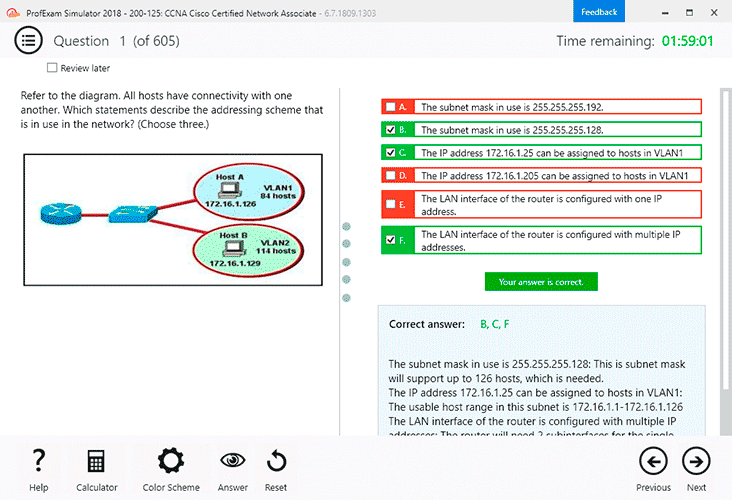
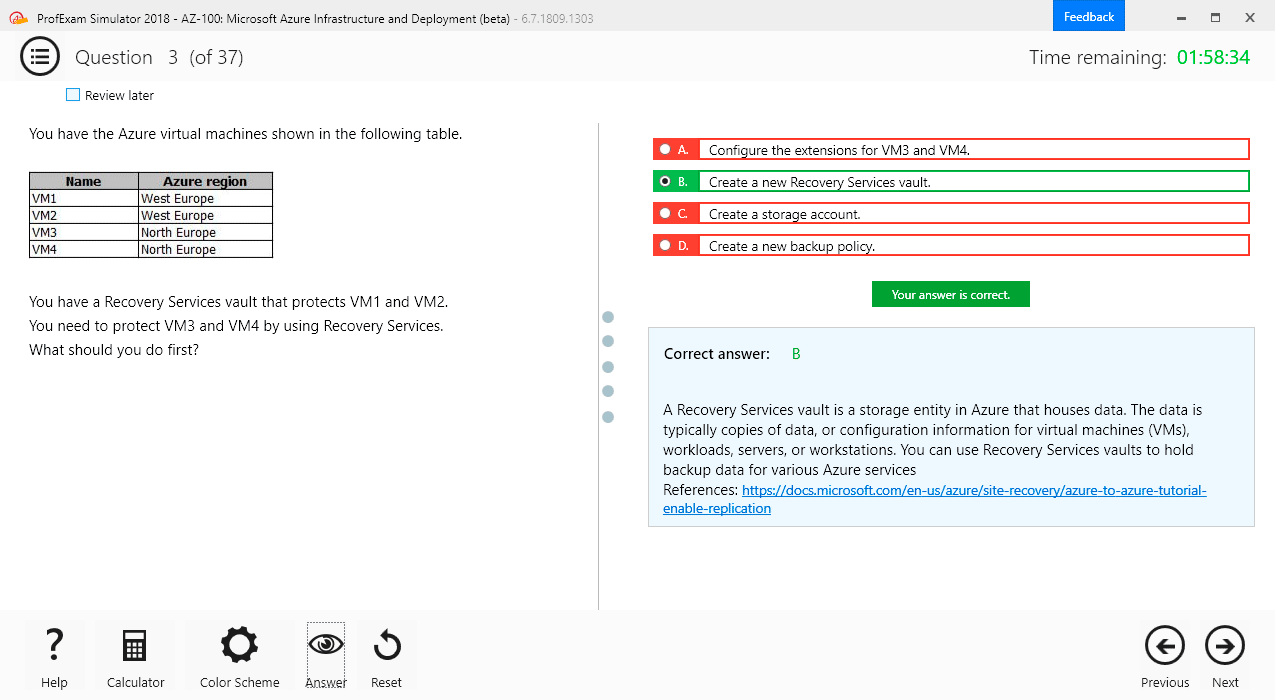
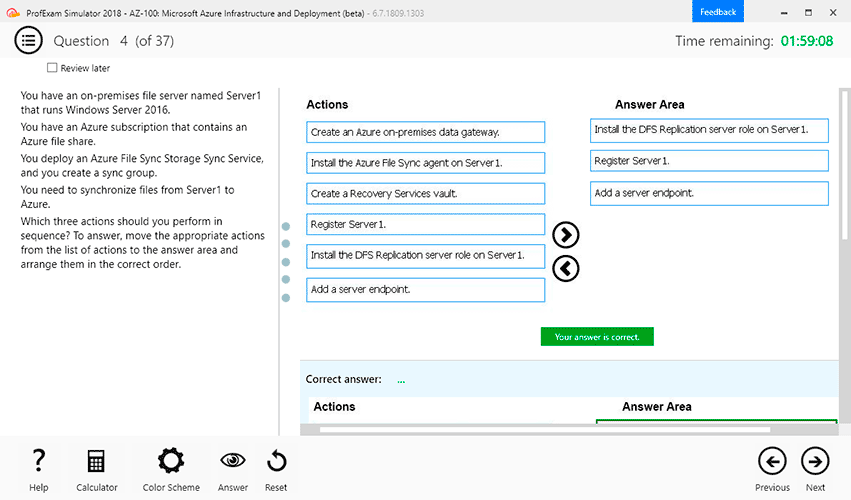
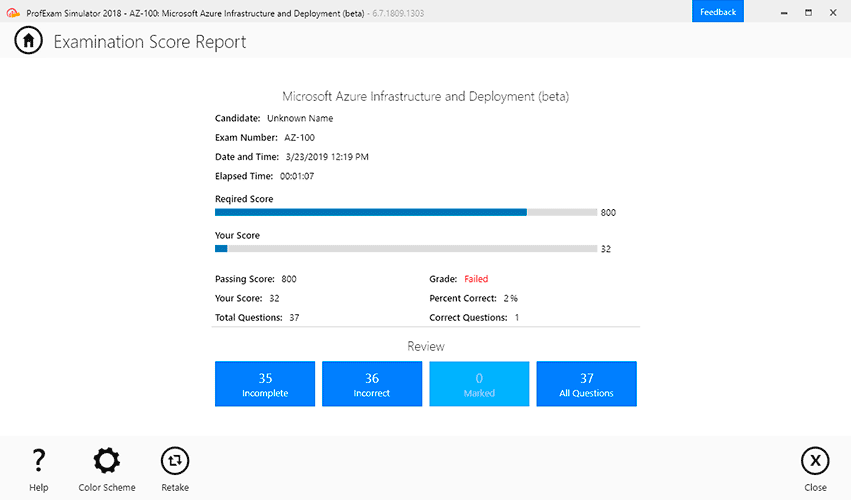
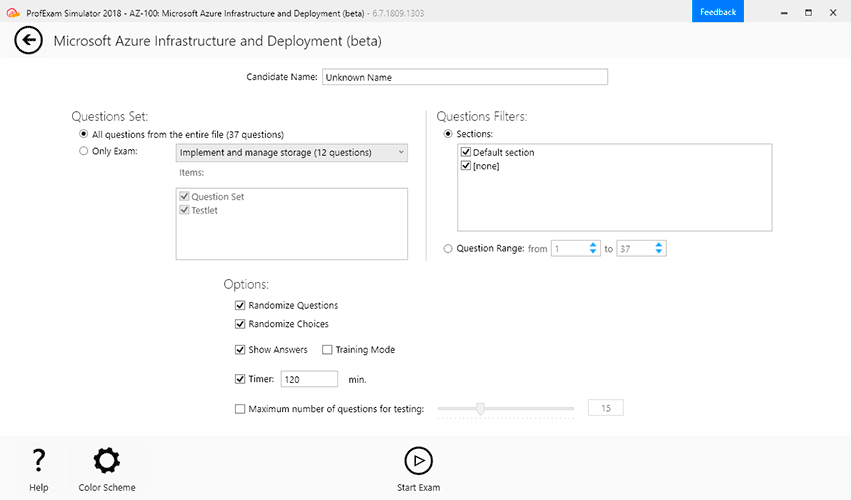
Demo Questions
Question 1
Chaincode in Hyperledger Fabric is a decentralized transactional program which is running on the validating nodes. Chaincode implements the Chaincode interface in particular, Init and Invoke functions.
Which two statements about Chaincode is correct? (Select two.)
- Init is called during instantiate transaction after the chaincode container has been established for the first time, allowing the chaincode to initialize its internal data
- Invoke is called to update or query the ledger after a proposal transaction. Update state variables are committed to the ledger before the transaction is committed
- Init is called during Instantiate transaction after the chaincode ledger has been established for the first time, allowing the chaincode to initialize its internal data
- Invoke is called to update or query the ledger in a proposal transaction. Updated state variables are not committed to the ledger until the transaction is committed.
Correct answer: AD
Explanation:
Chaincode is a decentralized transactional program, running on the validating nodes. As with every chaincode, it implements the Chaincode interface in particular, Init and Invoke functions. Init is called during Instantiate transaction after the chaincode container has been established for the first time, allowing the chaincode to initialize its internal data. Invoke is called to update or query the ledger in a proposal transaction. Updated state variables are not committed to the ledger until the transaction is committed. Chaincode is a decentralized transactional program, running on the validating nodes. As with every chaincode, it implements the Chaincode interface in particular, Init and Invoke functions. Init is called during Instantiate transaction after the chaincode container has been established for the first time, allowing the chaincode to initialize its internal data. Invoke is called to update or query the ledger in a proposal transaction. Updated state variables are not committed to the ledger until the transaction is committed.
Question 2
Blockchain solutions are comprised of four building blocks. Which of the following answers list the building blocks?
- Shared ledger, Privacy, Trust, and Smart Contracts or (Chaincode)
- Shared ledger, Centralization, Trustless, and Smart Contracts or (Chaincode)
- Shared ledger, Privacy, Trustless, and Smart Contracts or (Chaincode)
- Shared ledger, Centralization, Trust, and Smart Contacts or (Chaincode)
Correct answer: A
Question 3
An_____________ is defined as a communication node that is responsible for the distribution of blockchain transactions in Hyperledger Fabric.
- MSP
- Peer Node
- Client Node
- Endorsing Node
- Orderer
Correct answer: E
Explanation:
Orderer Ordering services handles the main function of the Hyperledger Fabric to maintain consistency in the transactions processes. Ordering services provides a shared communication to clients and peers and helps in broadcasting the messages containing transactions. Orderer Ordering services handles the main function of the Hyperledger Fabric to maintain consistency in the transactions processes. Ordering services provides a shared communication to clients and peers and helps in broadcasting the messages containing transactions.
Question 4
When your developing with Fabric Composer which of the following is true?
- Decrease the time of development
- Simplifies the development of applications
- Simplifies the code integration of applications
- Increases the time of development
Correct answer: A
Explanation:
Hyperledger Composer is an open-source application development framework which simplifies the creation of Hyperledger Fabric blockchain applications, thus reducing the time and complexity of development. The tool aims at helping users to create blockchain applications based on Hyperledger Fabric without needing to know the low-level (Go Programming) details involved in blockchain networks. Hyperledger Composer is an open-source application development framework which simplifies the creation of Hyperledger Fabric blockchain applications, thus reducing the time and complexity of development. The tool aims at helping users to create blockchain applications based on Hyperledger Fabric without needing to know the low-level (Go Programming) details involved in blockchain networks.
Question 5
Chaincode Services uses Docker to host (deploy) the chaincode without relying on any virtual machine or computer language.
What would be the main reason or best reason that Hyperledger chose containers over virtual machines?
- Docker provides a secured, lightweight method to sandbox chaincode execution that is “locked down”.
- Docker provides a secured, lightweight method to sandbox chaincode execution that is “locked down” but additional programming languages cannot be enabled
- Docker provides a secured, lightweight method to sandbox chaincode execution that is not “locked down”
- Docker is fully compatible with Hyperledger and Linux with an upgrade subscription.
Correct answer: A
Explanation:
Docker provides a secured, lightweight method to sandbox chaincode execution that is "locked down" Chaincode Services uses Docker to host (deploy) the chaincode without relying on any virtual machine or computer language. Docker provides a secured, lightweight method to sandbox chaincode execution. The environment is a "locked down" and secured container, along with a set of signed base images containing secure OS and chaincode language, runtime and SDK images for Golang Additional programming languages can be enabled Docker provides a secured, lightweight method to sandbox chaincode execution that is "locked down" Chaincode Services uses Docker to host (deploy) the chaincode without relying on any virtual machine or computer language. Docker provides a secured, lightweight method to sandbox chaincode execution. The environment is a "locked down" and secured container, along with a set of signed base images containing secure OS and chaincode language, runtime and SDK images for Golang Additional programming languages can be enabled
Question 6
What type of ledger refers to a distributed ledger that doesn’t require a native currency to operate?
- Tokenless
- Public
- Enterprise
- Private
Correct answer: A
Explanation:
A tokenless ledger refers to a distributed ledger that doesn’t require a native currency to operate. Generally, in a private blockchain tokens are not needed due to resources controlled by one party. A tokenless ledger refers to a distributed ledger that doesn’t require a native currency to operate. Generally, in a private blockchain tokens are not needed due to resources controlled by one party.
Question 7
What is the application that is used by Hyperledger Fabric to communicate with the network?
- SDK
- SOAP PI
- Golang
- RPC API
- Node.js
Correct answer: A
Explanation:
Hyperledger Fabric includes the REST and JSON RPC APIs, events, and an SDK for applications to communicate with the network. Hyperledger Fabric includes the REST and JSON RPC APIs, events, and an SDK for applications to communicate with the network.
Question 8
Which of the following statements would be the best answer when it comes to channels and the use of ordering services in Hyperledger Fabric?
- Channels ensure privacy in a blockchain network and ordering services may support many channels not just one channel.
- Channels ensure privacy in a blockchain network and ordering services may not support more than one channel.
- Channels do not ensure privacy in a blockchain and ordering services may not support more than one channel.
- Channels do not ensure privacy in a blockchain and ordering services may support many channels not just one channel.
- Channels do not ensure privacy in a blockchain network and ordering services may support many channels not just one channel.
Correct answer: A
Explanation:
Channels ensure privacy in a blockchain network Ordering services may support many channels no just one channel. Channels ensure privacy in a blockchain network Ordering services may support many channels no just one channel.
Question 9
Which of the following would NOT be true about what a smart contract(Chaincode) gives your organization?
- Autonomy
- Savings
- Trust
- Legal Assurance
Correct answer: D
Explanation:
While smart contracts (Chaincode) can be written to complement or substitute for legal contracts, their legal enforceability is not yet agreed upon by all state governments While smart contracts (Chaincode) can be written to complement or substitute for legal contracts, their legal enforceability is not yet agreed upon by all state governments
Question 10
What type of peer executes chaincode?
- Anchor peer
- Endorsing Peer
- Chaincode is executed by the client
- Ordered Peer
- Chaincode is not executed by a peer.
Correct answer: B
Explanation:
Endorsing Peer can be marked as Endorser peer (i.e. Endorsing peer). Upon receiving the “transaction invocation request” from the Client application the Endorser peer Validates the transaction. Check certificate details and roles of the requester. Executes the Chaincode (Smart Contract) and simulates the outcome of the transaction. But it does not update the ledger. At the end of the above two tasks the Endorser may approve to disapprove the transaction. As only the Endorser node executes the Chaincode (Smart Contract) so there is no necessity to install Chaincode in each and every node of the network which increases the scalability of the network. Endorsing Peer can be marked as Endorser peer (i.e. Endorsing peer). Upon receiving the “transaction invocation request” from the Client application the Endorser peer Validates the transaction. Check certificate details and roles of the requester. Executes the Chaincode (Smart Contract) and simulates the outcome of the transaction. But it does not update the ledger. At the end of the above two tasks the Endorser may approve to disapprove the transaction. As only the Endorser node executes the Chaincode (Smart Contract) so there is no necessity to install Chaincode in each and every node of the network which increases the scalability of the network.

